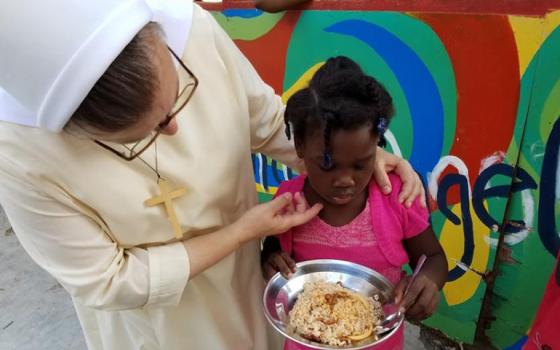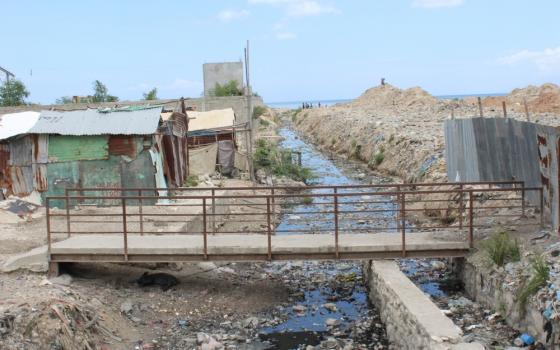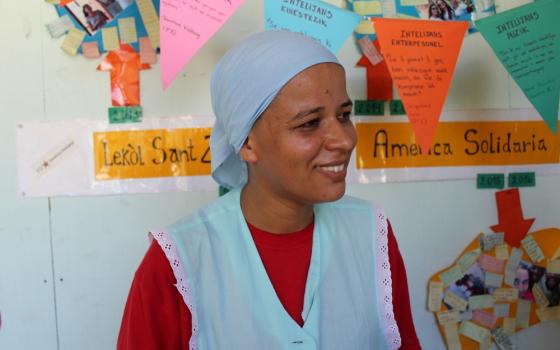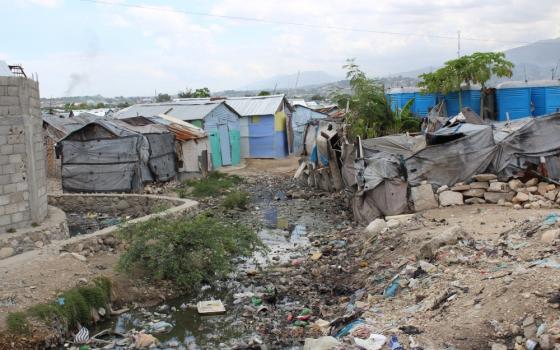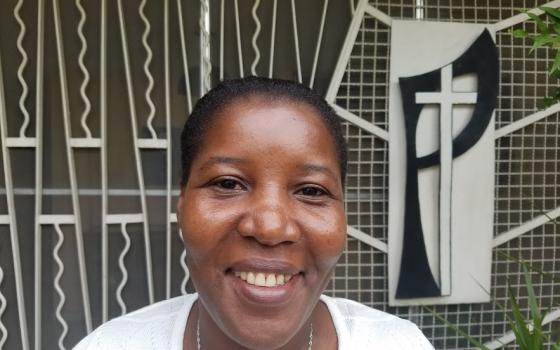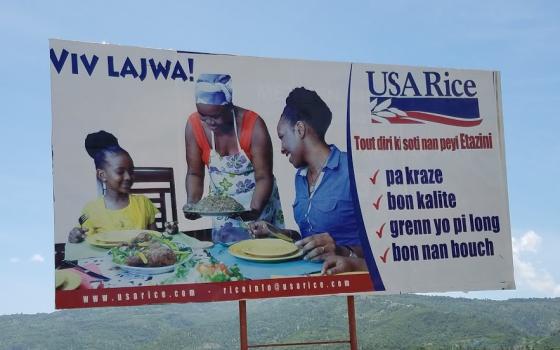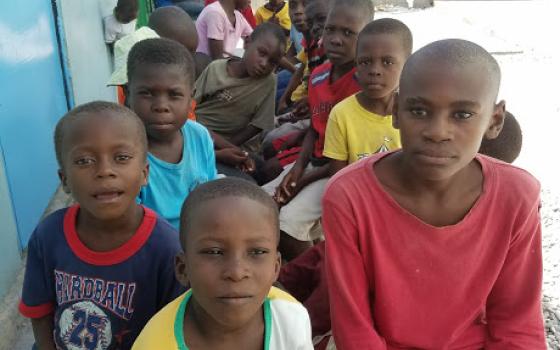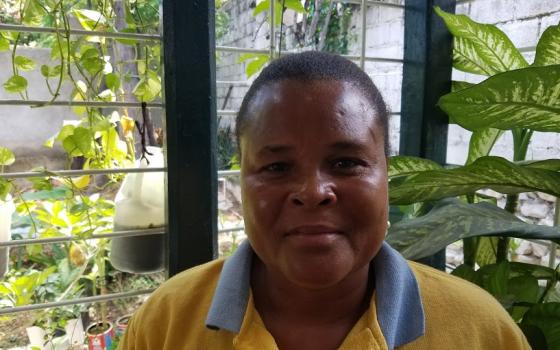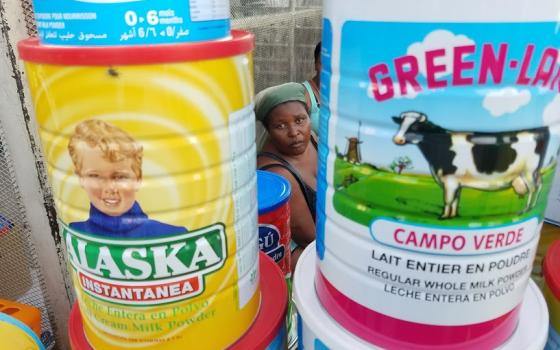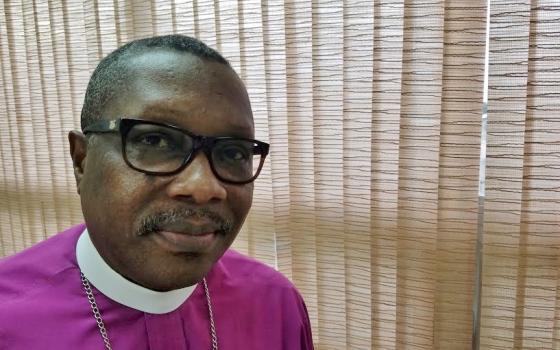Brazilian Sr. Renata Lópes spoke quietly, almost shyly, when reflecting on the conditions at Wharf Jeremile, a community located near Port-au-Prince's port area.
But her words carried weight — and worry.
"There are many, many problems here: lack of good water, lack of electricity, and hunger," said the sister who works with a group of Brazilian women and men religious known as Misión Belem.
Crime is endemic in the area — so much so that even United Nations peacekeeping forces are wary of coming to this low-lying zone of small shacks, unpaved roads and trash-cluttered canals. "But the hunger problem is probably the most difficult."
Why hunger specifically? "Because most of the people don't work, and if they don't work, there aren't enough meals in a day," she said. "They can't manage the situation with their families."
Sr. Merci-Christ Sylméon, a Haitian member of the Sisters of Providence, agrees. "Why is Haiti so poor? Because people don't have jobs, they don't work."
The answer may seem obvious — no work, no food. And yet it reveals a fundamental truth about Haiti, the poorest country in the Americas: endemic poverty has made the country chronically hungry. Nearly two-thirds of Haitians live in poverty, according to the United Nations' World Food Program, and nearly a quarter of the country lives in extreme poverty, which the U.N. defines as living on less than U.S. $1.25 a day.
That makes getting food on the table a huge struggle in Haiti: more than 50 percent of Haitians are undernourished, according to The State of Food Insecurity in the World 2015 report, authored by the WFP and other U.N. agencies.
The refrain of "I am hungry" is something the sisters like Lópes hear constantly, day in and day out. That is why in mission efforts both large and small, feeding people is a key part of what sisters in a variety of congregations do in Haiti.
On the southern coastal city of Jacmel, the work of Felician Srs. Mary Inga Borko and Marilyn Marie Minter includes serving meals as part of a community-based after-school program for about 60 children. It is inconceivable not to have a feeding program given the needs, said Borko. "We use everything we get for the children," she said recently as a cook working with the sisters served heaping plates of rice and beans to a group of children.
In the case of Misión Belem in Port-au-Prince — five sisters and three Catholic brothers — work means regularly providing meals to about 850 children on a regular basis — three times a day, most days. "Most days" means seven days a week when school is in session and lunch once a day during school breaks. The program is aimed at infants and children attending school, up to the age of 16. Funding for the program is provided by USAID, the U.S. government's development arm, and by the Florida-based humanitarian organization Food For The Poor.
Breakfast is cornmeal porridge; later in the day ready-made food packages are prepared to provide a mixture of rice, proteins, dehydrated vegetables and vitamins. "The mix is boiled with water and can be served alone as a complete meal -- each bag serves six portions -- or can be combined with beans, local vegetables or eggs," said Kathy Skipper, a Food For The Poor spokeswoman.
One of the students, Odline Jean Baptiste, 14, said the feeding program has eased the pressure on her family of eight. In early September, as a long school break was ending, she was eager to return to school, and not only for the breakfast and lunches provided. "I just want to get back and learn more," she said.
Lópes acknowledged that there are limits to what the mission does — there aren't, for example, resources to feed other family members who could use the food, such as mothers.
That points to a bald fact in Haiti: the hundreds, probably even thousands, of small-scale efforts to feed Haitians, particularly children, are substitutes for what should happen: government-funded programs that could potentially reach many more.
"The government should be resolving this problem," Lópes said. As it is, she and the other sisters are only doing "just a bit" of what a government with real clout and commitment could do.
Lópes is not alone in expressing frustration.
"It's a mess. We are trying to patch together what we can do," said Anglican Bishop Ogé Beauvoir, the executive director of Food for the Poor's Haiti operation.
But in a country where infrastructure is weak, the reach of the government is limited, and less than five percent of Haitians even pay taxes to fund government expenses, there is only so much that small-scale programs, as essential as they are, can do.
"A government without taxes is crippled," said Beauvoir.
The issue is not only the reach of government, of course — though Haitians and sisters involved in anti-hunger and anti-poverty efforts fault government corruption and bad leadership for much of what ails Haiti.
Ask Haitians about lingering problems of poverty and hunger, and talk inevitably returns to poor political leaders. "There are no real leaders in Haiti and the ones we have are corrupt," said Corrielan Thérése Moléron, a member of a women's self-help group in Port-au-Prince organized by Missionary Sisters of the Immaculate Heart of Mary, or ICM Sisters.
Upcoming presidential elections planned for Nov. 20 — delayed already because of political unrest earlier this year and more recently because of Hurricane Matthew — are not likely to change the country much, Moléron said. A long tradition of Haitian politicians using office for personal gain, both for themselves and their families, is hard to shake, she said.
"It won't change," Moléron said. "Even if a good man is elected president, those around him won't want change."
Electoral politics are not the only impediment. In a country where the unemployment rate reaches upward of 50 percent, years of political unrest have made outsiders skittish to invest in Haiti.
Even so, the relationship of outsiders to Haiti has been fraught from the beginning.
"The health care system is broken. The educational system is broken. It's not the Haitians' fault. They were at a disadvantage from the time of independence [onward]," said Sr. Judy Dohner, a Sister of the Humility of Mary, who manages a medical depot at the Nos Petits Frère et Soeurs Hospital in Port-au-Prince.
By that she means that, even after independence from the French, outside influence — whether it was the French seeking indemnities for property lost during the Haitian revolution that ended in 1804, or the United States ruling Haiti in a 1915-1934 occupation — has not helped Haiti. In fact, it has probably crippled it.
"Haiti has been paying for its independence for a very long time," Beauvoir said.
The result is frustration at all levels — a country smoldering in quiet, unspoken chaos.
"Poverty affects all of Haiti," said Sr. Janet Lehmann, the director of the nursing program of the University of Notre Dame Haiti's Jacmel campus. "The costs of hunger, malnutrition and a lack of education, are considerable. People die early."
The situation was dire enough before Hurricane Matthew, but now there is even more pressure on the country, say those who work with various sisters' congregations in Haiti and are responding to the latest disaster. "The population will face a dangerous food shortage in the coming weeks and months," Food for the Poor's Beauvoir said.
"Some of those who survived have already faced challenges which include going days without food," he said. "Food is scarce in remote areas, which has already led to a sharp rise in food prices for people who were already vulnerable before the passage of Hurricane Matthew."
More than a month after the hurricane, it is "safe to say that hunger is more prevalent than ever in Haiti and that food insecurity is a great impediment to the well-being of many Haitians affected by the natural disaster," he told GSR.
The storm swept away not only gardens, farms and fruit orchards but also livestock. "Goats, pigs and chickens that people rely on for protein and income were drowned or washed away by floods," Beauvoir said.
Also worrisome: "Massive erosion has covered once-fertile sea beds with sand. If the mangroves die, fish reproduction could be harmed in many coastal villages which rely on deep-sea fishing opportunities for food and income."
The country's dry period from January through March will exacerbate the crop losses, said Angel Aloma, executive director of Food for the Poor's overall operations. Based on assessments from those responding directly to the hurricane's aftermath, he said, "we expect a food shortage that will transform into famine over the next six months."
For now, much of the food is purchased outside of Haiti due to cost, but also because of the situation facing the country following Matthew, Skipper said. "Right now, emergency food imports are even more necessary due to the massive loss of local agriculture and livestock," she said.
In the past, Food For The Poor donors "have provided seeds, plants, fruit trees and agricultural tools for Haiti, as well as chickens, pigs, goats and cows," she said. "But much of this was destroyed as Hurricane Matthew cut a swath over the southwest peninsula of Haiti." As a result, Skipper said, "The need is so great there that we must ship in rice, beans, canned milk to save people's lives over the next six months or so until we can get them up and going again."
The trauma caused by Matthew comes on top of long-standing problems, say Beauvoir, Aloma and Beth Carroll, a program director who works in the Port-au-Prince offices of Catholic Relief Services.
Even before the hurricane, drought had already led to food shortages, forcing more people off the land, and causing increasing numbers of Haitians to leave rural areas and head toward large cities, Carroll said. That has led to more dependence on imported food, particularly rice from the United States — a dynamic that has long troubled many Haitians, and has been the subject of numerous studies.
One such study for the humanitarian organization Oxfam authored by agronomist Carlos Furche noted that, "Once a special food consumed on Sunday, rice has become the main staple of the Haitian diet, especially among low-income people." Imported rice, Furche said, "accounts for the vast bulk [83 percent] of consumption." Noting that "that any discussion of food security in Haiti must address the supply side of rice," Furche's report concluded that "a substantial increase in local production is needed to reduce dependence on external supplies, particularly given high and volatile international prices, and to improve the incomes of local producers, especially smallholder farmers."
The conclusion of such studies doesn't surprise Haitians. "The introduction of so much imported food has killed agriculture," Beauvoir said, adding that, long-term, Haiti needs to increase its internal production and make food produced in the country more affordable to Haitians.
In the short-term, the work of Catholic sisters and others is helping many people stave off the worst effects of hunger. "There are no better projects than the programs run by the sisters," Aloma said. "They [the sisters] would be wealthy if they were entrepreneurs, they are so well- organized and disciplined."
But to the sisters, such praise means little in the face of so unnecessary illness and death.
The coffins of infants and small children are a common sight at the chapel on the hospital ground where Dohner works.
"The problem in Haiti is poverty," Dohner said, "It's simple." That points to something systemic, stark and troubling. "Evil is black and white in Haiti," she said, "and the evil is poverty."
[Chris Herlinger is GSR international correspondent. His email address is cherlinger@ncronline.org.]
